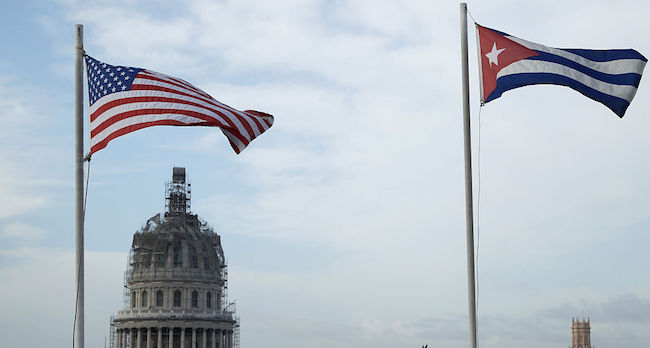
In the days following the death of Fidel Castro, then-President-elect Donald Trump did exactly what one might expect: He took to Twitter. Trump condemned the “deal” the Obama administration put in place over the course of its normalization process with Cuba. “If Cuba is unwilling to make a better deal for the Cuban people, the Cuban/American people and the U.S. as a whole, I will terminate deal,” Trump tweeted.
Today at the Manuel Artime Theater in Miami’s Little Havana neighborhood, Trump unveiled his administration’s Cuba policy — though not necessarily to the benefit of the Cuban or American people, as his tweet pledged.
Following statements by his Cuban-American congressional allies Sen. Marco Rubio, R-Fla., and Rep. Mario Diaz-Balart, R-Fla., as well as Florida Governor Rick Scott and Vice President Mike Pence, Trump promised to roll back recent openings with Cuba. “We will enforce the ban on tourism,” he proclaimed. “We will enforce the embargo. We will take concrete steps to ensure that investments flow directly to the people so they can open private businesses and begin to build their country’s great, great future, a country of great potential.”
Trump is on the cusp of reversing President Barack Obama’s limited opening to Cuba, moving back toward Cold War-era policies designed as part of a catastrophically failed half-century attempt to foster regime change. “This is a reversion to a policy that never worked,” said Marguerite Jiménez, who oversaw commercial relations between the U.S. and Cuba during her tenure as senior policy advisor to Obama’s Secretary of Commerce Penny Pritzker. “This isn’t a new deal,” Jiménez said. “This is an old deal. And it’s and old bad deal.”
Carried out under the unlikely banner, for Trump, of human rights and democracy, the shift is instead more likely to re-impose hardships on ordinary Cubans — the very same people Trump, Rubio, and Diaz-Balart claim to champion.
In December 2014, Obama took a new approach to engagement with Cuba, which successive American governments had been working to isolate since after the island nation’s communist revolution in 1958. The Obama policy shift culminated in 23 bilateral agreements between the historic foes, leading to increased financial investments and travel to the island and, therefore, bolstering its nascent private sector.
Diplomatic ties and bilateral agreements will likely remain intact, according to Emily Mendrala, who served in Obama’s National Security Council as a Director for Legislative Affairs, where she coordinated congressional policy discussions on Cuba. “The bilateral agreements represent countless hours of careful discussion between our two governments, and have resulted in concrete cooperation on issues ranging from real-time law enforcement information sharing to the resumption of direct mail between our two countries,” Mendrala said. “It would be extremely counterproductive to revert back to the previous time-consuming policy of exchanging formal diplomatic notes each time our two countries needed to communicate.”
Central to Trump’s plan is a ban on financial transactions with any enterprises owned or run by the business division of the Cuban military. The military’s Grupo de Administración Empresarial S.A., or GAESA, is estimated to oversee 50 to 60 percent of the entire Cuban economy. But GAESA, an entity integral to Cuba’s estimated $3 billion to $4 billion tourist industry, is by no means the only actor taking a hit. Trump’s policy will also impose harsh restrictions on travel to the country, effectively squelching a wave of American tourism. Though still technically illegal under Obama’s new policies, tourism had nevertheless burgeoned under the 12 approved categories for legitimate travel laid out by the U.S. during the normalization process.
While Trump’s new restrictions are intended to impede economic or financial advantages for the Cuban government, which has been led by Fidel’s brother Raúl since 2008, any policy that limits travel will inevitably hurt Cubans, said William LeoGrande, who teaches government at American University and co-authored the book “Back Channel to Cuba: The Hidden History of Negotiations between Washington and Havana.” “When Americans go down there, a lot of them stay in private homes, they eat in private restaurants, they take private taxis, and they pay private tour guides that guide them around the city,” LeoGrande said. “That’s money directly into the hands of ordinary Cubans.”
Many of these Cubans themselves agree. “It’s a fundamentally negative thing,” said Paver Core Broche, who owns and runs a café in Havana’s Vedado neighborhood, of Trump’s policy shifts, speculating that they would “block our financial development, increased employment, and economic possibilities.”
Cubans like Core Broche are justifiably wary of Trump’s alliance with the influential Cuban Lobby, a wealthy and politically active cohort of right-wing exiles in Miami, in the key electoral swing state of Florida. Republican Cuban-Americans like Rubio have long pushed for a hardline against Cuba. In this sense, Cuba has transformed from an enduring diplomatic anomaly and geopolitical issue into a matter of domestic policy and electoral kowtowing.
And yet hindering the financial wellbeing of Cubans has long proved an ideologically tenuous product of the 56-year-old embargo against the country. At its inception, the embargo articulated a desire for regime change; now, the Trump administration is passing off the embargo that impoverished Cubans as pressure on the Castro government for reforms on human rights issues and to encourage “democratic values.”
“It’s hard to believe that human rights are really anything more than just an excuse,” said LeoGrande, the American University professor. “This is really more a matter of political horse trading than it is a matter of foreign policy.”
The post Trump To Reverse Obama Openings To Cuba Under the False Flag of Human Rights appeared first on The Intercept.
